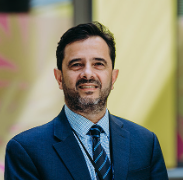
Prof Nick Pavlakis
Regorafenib confers an overall survival benefit over placebo when used for patients with refractory advanced gastro-oesophageal carcinoma (AGOC), an Australian-led phase 3 trial has shown.
Final results from the INTEGRATE-IIa study, presented by Professor Nick Pavlakis at the at the 2023 ASCO Gastrointestinal Cancers Symposium (ASCO GI) in San Francisco showed that third line treatment with the oral multi-targeted tyrosine kinase inhibitor (TKI) improved overall survival by more than 30% compared to placebo.
The international randomised controlled trial was led by the Australasian Gastro-Intestinal Trials Group (AGITG) and conducted by the NHMRC Clinical Trials Centre (NHMRC CTC).
In the study 251 patients from 40 sites across six countries were randomised to receive either regorafenib 160mg or placebo, with best supportive care provided to each arm. Participants were patients with AGOC who failed or been found intolerant to a minimum of two lines of prior anti-cancer therapy, including a platinum agent and a fluoropyrimidine analogue.
The trial met its primary endpoint of a statistically significant improvement in overall survival, with 12-month survival rates of 19% for regorafenib compared with 6% for placebo (Hazard Ratio 0.68). After 238 events, median OS was 4.5 months for regorafenib vs 4.0 for placebo (HR 0.70 [95%CI: 0.53 to 0.92]; p = 0.011) in the whole study population, with a 12 mo survival of 19% vs 6%. Median PFS was 1.8 v 1.6 (HR = 0.52; [95%CI: 0.40-0.69]; p = < .0001).
A pooled analysis median OS was 5.0 months v 4.1 months (HR 0.69 [95% CI:0.56 to 0.87]; p = 0.001).
The results also confirmed previous findings of improved progression free survival for regorafenib versus placebo (HR 0.53, 95% CI [0.40, 0.70]; P = < .0001).
Regorafenib treatment also significantly delayed deterioration in global quality of life compared with the control arm (P = .0043).
“The INTEGRATE-IIa study confirms a survival benefit of regorafenib over placebo in patients who are refractory to chemotherapy but remain well enough to receive and who seek more treatment. Regorafenib should be a new treatment option for these patients,” said lead investigator Professor Pavlakis of the University of Sydney.
According to the product information supplied to the TGA by sponsor Bayer, regorafenib is an oral anti-tumour agent that potently blocks multiple protein kinases, including kinases involved in tumour angiogenesis (VEGFR1, -2, -3, TIE2), oncogenesis (KIT, RET, RAF1, BRAF), metastasis (VEGFR3, PDGFR, FGFR) and tumour immunity (CSF1R). In particular, regorafenib inhibits mutated KIT, a major oncogenic driver in gastrointestinal stromal tumours and thereby blocks tumour cell proliferation. The INTEGRATE IIa trial was conducted independently of Bayer.
In a statement released on 20 January the AGITG said it is now leading a multinational, phase III study called INTEGRATE IIb, conducted by the NHMRC CTC, which is further investigating the combination of regorafenib and nivolumab, compared to standard chemotherapy alone.
AGITG said regorafenib is the first oral multi-targeted tyrosine kinase inhibitor (TKI) to demonstrate improved overall survival in a mixed population of Asian and non-Asian patients with metastatic or locally recurrent gastro-oesophageal cancer.